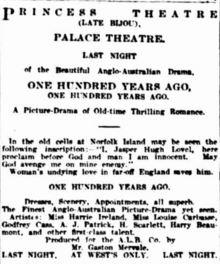
Louise Lovely was an Australian film actress of Swiss-Italian descent. She is credited by film historians as being the first Australian actress to have a successful career in Hollywood, signing a contract with Universal Pictures in the United States in 1914. Lovely appeared in 50 American films and ten Australian films before retiring from acting in 1925.

George Marlow was an Australian theatrical entrepreneur born in London of Jewish extraction, noted for bringing melodrama and pantomime to Sydney audiences in the early 1900s. His name has been frequently mis-spelled as "George Marlowe".

The Romantic Story of Margaret Catchpole, generally referred to as Margaret Catchpole, is a 1911 Australian silent film directed by Raymond Longford and starring Lottie Lyell. It is based on the true story of Margaret Catchpole, an adventurer and convict.
The Luck of Roaring Camp is a 1911 Australian feature-length film directed by W. J. Lincoln now considered a lost film. It was highly regarded in its day, in part because it was based on a play that was popular with audiences.
The Life of Rufus Dawes is a 1911 Australian silent film based on Alfred Dampier's stage adaptation of the 1874 novel For the Term of His Natural Life produced by Charles Cozens Spencer.
A Ticket in Tatts is a 1911 Australian silent film directed by Gaston Mervale.
A Tale of the Australian Bush is a 1911 Australian silent film directed by Gaston Mervale. Set in colonial Australia, it was also known as Ben Hall, the Notorious Bushranger and is considered a lost film.
The Colleen Bawn is a 1911 Australian silent film directed by Gaston Mervale starring Louise Lovely. It is adapted from a popular melodrama by Dion Boucicault.
A Daughter of Australia is a 1912 Australian silent film directed by Gaston Mervale starring Louise Lovely, then known as Louise Carbasse. It was set in the early days of the Australian goldfields and is considered a lost film.

The Wreck of the Dunbar or The Yeoman's Wedding is a 1912 Australian silent film directed by Gaston Mervale starring Louise Lovely. The plot concerns the shipwreck of the Dunbar, one of Australia's worst maritime disasters. It is considered a lost film.
The Ticket of Leave Man is a 1912 Australian silent film directed by Gaston Mervale starring Louise Lovely.

Sentenced for Life is an Australian film directed by E. I. Cole. It was an adaptation of a play performed by Cole and his Bohemian Dramatic Company as early as 1904.

Dan Morgan is a 1911 Australian film from Charles Cozens Spencer about the bushranger Daniel Morgan. It was said to be starring "Alfred Rolfe and company". Rolfe directed three movies for Spencer, all starring himself and his wife Lily Dampier so there is a chance he may have directed this one and that it starred his wife. A prospectus for the Australian Photo Play Company said he directed it. It is considered a lost film.
The Australian Life Biograph Company was a short lived Australian film production company in the silent era. It funded many of the early films of Gaston Mervale and Louise Lovely.

Patrick William Marony, known professionally as P. W. Marony, was an Australian painter, political cartoonist, photographer and writer. Marony's practice as an artist and a writer spanned the period of cultural transition from the popularity of history painting to the emergence of cinematic versions of history. He painted a series of bushranger-themed works which were exhibited in the mid-1890s. Marony wrote several film scripts for the Australian Life Biograph Company. Twenty-six of his oil paintings, mostly of bushrangers, are a part of the collection of the National Library of Australia.
The Australian Film Syndicate was a short lived Australian film production company based in North Sydney. According to novelist Arthur Wright, "A local draper put a lot of money into it, and lost it; though all the films produced were not 'duds.' One which paid its way well was an adaptation of my novel, Gamblers Gold."
Only a Factory Girl is a 1911 Australian film. Very little is known about it and it is considered a lost film.
The Warning is a melodrama written by "Henry Bosnell" on the subject of white slavery and promoted as a remedy to an urgent social evil. It opened at the Little Theatre, Sydney on 22 November 1913 and ran for six weeks to good houses.
Wilton Welch was an Australian comic actor and dramatist, husband and collaborator of Louise Carbasse, best known as Louise Lovely.
Midnight Interlude is a 1931 Australian radio play by Rex Rienits. It was one of the earliest Australian written plays on radio. The play helped launch Rienits' career as a radio writer.







